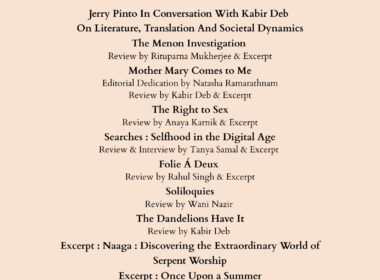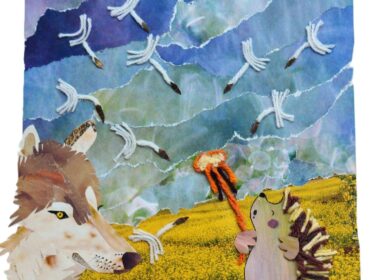Review: On the Banks of the Pampa | Volga | Translated by Purnima Tammireddy
By Rituparna Mukherjee

The only way to keep the small folk loyal is to make certain that they fear you more than they do the enemy. Remember that if you ever hope to become a queen.
Game of Thrones, Season 2, Ep. 9
Cersei Lannister, in educating young Sansa Stark on the basics of governance, casts a very realistic glance on how power systems operate in controlling a large mass of people. Volga’s novella On the Banks of the Pampa, translated deftly by Purnima Tamireddy from Telugu, is situated in the milieu of the mythological era of the Ramayana, but is very much a text of the present times. A noted feminist, Volga tries to reimagine the Ramayana universe in taking the character of Sabari, but unlike most feminist retellings of the myths, the text is not stuck merely at giving voice to characters who are either typecast or fall through the cracks of history into oblivion. This slim novella, at a mere 125 pages, packs a lot in it and does so successfully without seeming contrived. Taking the thread of Sabari’s conversation with Ramachandra, the novella goes into the very heart of kingship, kingmaking and leadership, that is a tale of our times.
Faith and fear emerge as the twin pillars of ‘nagarikata’ on which dominion over the common folk is sustained. Sutapa, an Ayodhyavasi and a simple weaver, embodies this subtle dominance which is extended by the state. He is a catalyst of sorts in the narrative. Following Ramachandra’s exile, Sutapa ventures beyond the Sarayu River and heads to the forests of the South where Ramachandra is supposedly headed. But very soon, the journey becomes his own. He is guided by his own wanderlust and quite like the modern urban tourist finds repose in the lap of nature but also fears its unfamiliarity and is self-aware enough to know that the forests, in all their glory, is not for him. In fact, Sutapa has been brought up to fear anything that does not follow the prescriptive, preordained and normative codes, which is reflective of citizenry not only in our country but in most parts of the world.
The exchange between Sutapa and his elder brother Padmapada is one of the most interesting episodes in the novella. Padmapada, being the older, more experienced and worldly individual, slices through Sutapa’s fascination with kingship, power and finery, and presents the point of view of the common people, whose lives continue with major and minor adjustments, irrespective of leadership. He questions the grand narratives that the common folk are fed by kingmakers to keep them in tow.
How does it matter who becomes the king? What difference would it make? If Ramachandra takes over the throne, tell me one good change that would happen in our lives. (emphasis in the original, p.85)
Sutapa’s fear of his brother’s dissent and later of Sabari’s uncanny wisdom and Kabanda’s oneness with nature, represents the quandary of the city-dweller, who in going through the motions of life, actually belongs nowhere in particular. This passage is a mirror to those of us who stay away from dissent, in fear or awe of the leadership. In fact, another episode following the heels of this exchange is the one between Kaikeyi and Vashistha that focusses on Brahmanical patriarchy, power systems and kingmaking. It speaks of the insidious control over people using faith as a medium, with an enigmatic, charismatic leader at the forefront, who appears no less than a coloniser. This exchange absolves Kaikeyi of the historical blame she carries and shows how women are at times forced to be the carriers of patriarchy. It highlights the anthropocentric greed for resources which undermines the sanctity of human and non-human life and comes out of a deep distrust of the other.
Unlike us, they don’t have kingdoms and power structures, and neither do they follow any dharma. They have no idea of what it means to be civilised; they are full of ignorance. But there’s unimaginable wealth present in the forests. Rama must live in these forests to bring them into our fold of dharma and their riches under our control. He has to make them passionate about nagarikata and the Arya dharma. (p.91)
In fact, the anthropocentric city and the eco-centric life of the aranyavasis are juxtaposed in the novella from the very beginning through the terrifying experiences of Matanga Muni, an untouchable, in the city, as he questions the ‘jnanam’ he has received so far and forsakes it to adapt a life of ‘ajnanam’ of the forest-dwellers. His experience and that of Sabari’s at the detention camps of the city reminds one of the bio-political nature of citizenry where enhanced surveillance tactics and codes of conduct are marked on the bodies of its inhabitants. While reading the text, and with what has come to pass all around us in the recent history of our country, one might easily question like Matunga:
What is it about the human nature that breeds such animosity towards another? How can anyone rejoice in inflicting pain upon someone else? Who or what induces such behaviour? (p. 61)
The comprehensive discussions about these two forms of life in the initial half of the text, which at times can read a little preachy, are geared to address this dichotomy and although the text is somewhat partial to the life in the forest with Sabari’s beauty and peaceful wisdom as its manifestation, it doesn’t denigrate life in the cities or its citizens. What it tries to question and subvert is the idea of civilization and knowledge systems peddled by its rulers. The entire text builds up to the meeting of these two forms of life in Ramachandra and Sabari’s discussion and mulling on the idea of a benevolent leader. The central question that this novella posits is if we were ever free of the violence of colonization. Who is the other and who determines who is an outsider?
This work of translation does justice to its original in two primary ways. Purnima Tamireddy’s translation clearly showcases how poetic the original must have been. The text ably aligns to the two forms of life through its clever stylistic use of language, with the descriptions of the life in Sabari’s ashram on the banks of the Pampa rendered in lyrical prose, while those of the city in practical, straightforward phrasing. Moreover, the translation has cleverly retained the philosophical terms like ‘rajyam’, ‘jnanam’, ‘ajnanam’ ‘nagarikata’ and ‘dharma’ in their original complexity instead of their English counterparts, bringing to a wider audience not just Volga’s ecofeminist consciousness but also a book that is very satisfactorily prescient.
VOLGA is a writer, critic, translator and poet, who has been a forerunner in introducing a feminist perspective into the literary-political discourse of the Telugu-speaking states. One of the most significant figures in Telugu literature today, her works opened the floodgates for a host of women writers to articulate the doubts and confusions they experienced as women. Her novel Sveccha (Freedom) marks a watershed in women’s writing in Telugu and is now being published in all Indian languages by the National Book Trust of India. Her other works include the short-story collection Rajakiya Kathalu (Political Stories), that looks at the oppression of and control on a woman’s body; Maaku Godalu Levu (We Have No Walls), the first volume in feminist philosophy in Telugu, which she edited; and an anthology of feminist poems, Neeli Meghalu (Dark Clouds), also one she edited. She co-authored Saramsam, which documents the anti-arrack struggle, and Mahilavaranam (Womanscape), a detailed collective biography of important Telugu women of the twentieth century.

Purnima Tammireddy is a writer, translator and publisher, working in both Telugu and English. She was a writer-in-residence at the 2022 Sangam House International Writer Residency. She has translated into Telugu Manto’s Siya Hashiye and Amrita Pritam’s Pinjar. Her English translation of the memoir of Mallu Swarajyam, the leader of the Telangana Peasants’ Armed Struggle, is forthcoming. She is also the author of the short-story collection, Emotional Pregnancy.
In 2022, Purnima founded Elami Publications, an independent Telugu publishing house, and co-founded pustakam.net, a website for book reviews, in 2009. A techie by profession, she currently lives in Bengaluru.

Rituparna Mukherjee teaches English and Communication Studies at Jogamaya Devi College, Kolkata. She enjoys writing short fiction and flashes. A multilingual translator of Bengali and Hindi fiction into English, her original work and translations have been published in Samovar, The Bombay Literary Magazine, Usawa Literary Review, Skipjack Review, Hakara Bilingual, State of Matter, MuseIndia among others. Her debut translation, The One-Legged, translated from Sakyajit Bhattacharya’s Ekanore, has been shortlisted for JCB Prize in Literature 2024 and won the KALA Literature Awards 2025. She is currently translating a political thriller set in West Bengal as well as a memoir dealing with gender issues. She is the fiction reader at Usawa Literary Review.





